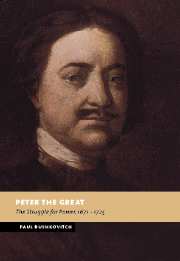Book contents
- Frontmatter
- Contents
- Preface
- List of abbreviations
- Introduction
- Prologue: Court politics and reform
- 1 Tsar and boyars: structures and values
- 2 The ascendancy of Artamon Matveev, 1671–1676
- 3 The reign of Tsar Fyodor, 1676–1682
- 4 The regency of Sofia, 1682–1689
- 5 Peter in power, 1689–1699
- 6 Peter and the favorites: Golovin and Menshikov, 1699–1706
- 7 Poltava and the new gubernias, 1707–1709
- 8 The Senate and the eclipse of Menshikov, 1709–1715
- 9 The affair of the tsarevich, 1715–1717
- 10 The end of Aleksei Petrovich, 1718
- Epilogue and conclusion, 1718–1725
- Bibliography
- Index
9 - The affair of the tsarevich, 1715–1717
Published online by Cambridge University Press: 25 July 2009
- Frontmatter
- Contents
- Preface
- List of abbreviations
- Introduction
- Prologue: Court politics and reform
- 1 Tsar and boyars: structures and values
- 2 The ascendancy of Artamon Matveev, 1671–1676
- 3 The reign of Tsar Fyodor, 1676–1682
- 4 The regency of Sofia, 1682–1689
- 5 Peter in power, 1689–1699
- 6 Peter and the favorites: Golovin and Menshikov, 1699–1706
- 7 Poltava and the new gubernias, 1707–1709
- 8 The Senate and the eclipse of Menshikov, 1709–1715
- 9 The affair of the tsarevich, 1715–1717
- 10 The end of Aleksei Petrovich, 1718
- Epilogue and conclusion, 1718–1725
- Bibliography
- Index
Summary
By summer 1715, the full disgrace of Menshikov seemed to have been checked, but his power was still curbed and his ill-gotten gains in the process of restoration. A certain balance had been established at court to the advantage of Menshikov's enemies. Events in the next year, however, would conspire to restore Menshikov to favor and to put in the forefront of opposition to both the favorite and his master the tsar a person who had hitherto lurked in the background of court and politics, the Tsarevich Aleksei Petrovich.
The tsarevich had been involved with oppositional currents at court as early as the 1690s, at the time of Peter's divorce from his mother. By 1707 some thought him a potential rival to Menshikov, and he had figured in the plans of Charles XII to exploit discontent among Russian aristocrats. Nothing came of all this, and the boy grew to manhood serving as a sort of logistics assistant for his father, keeping supplies flowing from Moscow in the critical years before Poltava. In these years Aleksei also received an education, and not a bad one. The original plan of his education drawn up by Baron Huyssen around 1703 reflected the priorities. He was to study the Bible and Russian grammar, as well as mathematics and history. The 1703 plan called for French, but in fact he only learned German well enough to speak it and apparently some French, Polish, and Latin.
- Type
- Chapter
- Information
- Peter the GreatThe Struggle for Power, 1671–1725, pp. 339 - 382Publisher: Cambridge University PressPrint publication year: 2001



